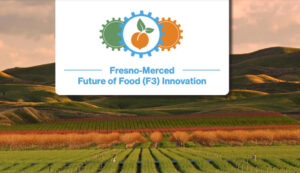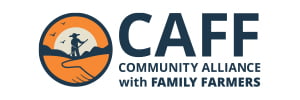 Earlier this year, CAFF kicked off a massive project in the San Joaquin Valley to help support family farms there and strengthen the local food economy, in partnership with UC Agriculture & Natural Resources (UC ANR) and the Central Valley Community Foundation (CVCF), among others. Why take on such a big project? Because despite some of the most agriculturally productive lands in the country, many of the region’s 13,000+ farmers are struggling with high costs and climate change, unemployment remains high, and families are hungry.
Earlier this year, CAFF kicked off a massive project in the San Joaquin Valley to help support family farms there and strengthen the local food economy, in partnership with UC Agriculture & Natural Resources (UC ANR) and the Central Valley Community Foundation (CVCF), among others. Why take on such a big project? Because despite some of the most agriculturally productive lands in the country, many of the region’s 13,000+ farmers are struggling with high costs and climate change, unemployment remains high, and families are hungry.
The $65.1 million Fresno-Merced Future of Food Innovation (F3) project, funded by the federal Economic Development Administration, offers an opportunity to spur inclusive economic innovation that centers small farmers, ensure a just transition and new pathways for employment, and forge new opportunities for re-investing in local businesses and food systems. The project includes three main components: F3 Innovate, focusing on commercializing new technologies with businesses, Ag-TEC, which creates new job pathways with the region’s 13 community colleges, and the Local Farm & Food Initiative (F3 Local), which CAFF will help guide alongside with UC ANR.

This project was sparked by a community-led economic development strategy funded by the James Irvine Foundation called Fresno DRIVE. The DRIVE Community Investment Plan released in 2019 identified 19 community initiatives, including what was then called the Fresno-Merced Food Innovation Corridor. The Governor and California Department of Food and Agriculture seeded an early investment in the initiative, which provoked community discussions and a 2020 “vision” document—deliberated over by academic, agricultural, environmental justice, farmworker, government, and philanthropic institutions—to guide it and future investments.
CAFF’s Background
CAFF’s origin story stems from a quest for more appropriate technology. In the 19702, in the wake of the Bracero immigration program’s end, an economic downturn, market concentration, and new technological development, researchers at the University of California developed an industrial-scaled mechanical tomato harvester, which added fuel to the fire, pushing farmers “to get big or get out”. Thousands of small farms who couldn’t compete went out of business while the industry consolidated. One of our parent organizations litigated against the UC in 1979, demanding that public investments not put smaller farms at a disadvantage, resulting in the creation of the UC Small Farm Program and UC Small Farm Center. The statewide program recently became part of the larger UC Sustainable Agriculture Research & Education Program, another program CAFF advanced in the state legislature. Today, farmer-centered, economically viable and environmentally sustainable — three of our six core values — serve as guideposts for future technological development.

Del Valle
Farms are more than businesses, but they must pencil out. Despite a significant number of farms, little infrastructure exists to sell food and farm products in local markets in the San Joaquin Valley. Many farmers focus on sales outside the region, and through channels that move capital outside the Valley. The Del Valle portion of F3 Local is focused on creating a regional marketing identity for and driving demand, while also diminishing barriers for farmers and buyers to increase sales. We’re working with Fresno BIPOC Produce to scale up operations as a local aggregator to help farmers reach new markets. And we’re learning lessons from the hard work of Fresno Food Commons about timing, capacity, and diversification.

Agroecology Hub
With more secure local markets, farmers can focus on production and new tools (and vice-versa). From hand tools to new software and water sensors, many tools aren’t developed with smaller producers in mind. And yet, most farmers in the SJ Valley and across the world are small producers, with nearly 94% of all farmers globally operating on less than 15 acres of land. CAFF aims to change that by creating a Small Farm Technology Innovation Alliance that puts small farms in the driver’s seat of tech development, designing, trialing and testing tools in conversation with developers. The Small Farm Tech Expo and Small Farm Tech Innovation Challenge are two specific opportunities to focus that effort in the Fresno Region.
In the 2020 F3 vision development process, partners consented to the following principles for appropriate and inclusive technology development: affordable, appropriately scaled, accessible, translatable & transferable, low-risk, multi-beneficial, networked, and protective of privacy. These principles will guide tech development into the future.


